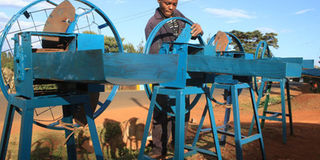My simple chaff-cutters make chopping fodder easy task

Paul Murage adjusts a chaff-cutter outside his workshop in Nyeri. Murage makes manual and electrical chaff-cutters that he sells to dairy farmers at between Sh20,000 and Sh25,000. PHOTO | JOSEPH KANYI | NATION MEDIA GROUP
What you need to know:
- Murage makes manual and electrical chaff-cutters that he sells to dairy farmers at between Sh20,000 and Sh25,000.
- He uses stainless steel metal to make them since the material is not only durable, but also lighter and readily available.
- The metal used in making the cutter’s blade is crucial.
The clanking of metal gets louder as one approaches Peter Murage’s workshop in Ruring’u, Nyeri.
He is dressed in a navy blue apron and goggles as he joins two metals when we meet him.
Murage makes manual and electrical chaff-cutters that he sells to dairy farmers at between Sh20,000 and Sh25,000.
“I am working to carve a niche for myself in the market dominated by imports,” says Murage, who displays his machines outside his workshop.
He uses stainless steel metal to make them since the material is not only durable, but also lighter and readily available.
“Imported machines go for at least Sh45,000 but I sell mine at half the price enabling farmers to save,” says the National Youth Service trained artisan, noting that he buys the metal in Nairobi, cuts into the desired design before he joins them.
BETTER ANIMAL FEED PREPARATION
In a day, Murage who acquired the knowledge from National Youth Service, which he joined in 2011, makes one or two machines depending on the availability of materials or demand.
“I have sold machines all over Nyeri and other counties. People help me sell them through referrals,” says 26-year-old, who went into welding by starting with making jikos and later upgraded to windows before switching to chaff-cutters.
Samuel Kinyua, a farmer in Naro Moru who is using the machine, says it has bettered his animal feeds preparation.
“I bought it during a farmers’ field day at the Wambugu Agricultural Training Centre in Nyeri three years ago.”
John Wambugu, an agro-expert at Wambugu training centre, says the metal used in making the cutter’s blade is crucial.
“If it’s not made of steel, you will keep going to the welder all the time because other materials may not be repairable.”
He adds farmers should also look out for the size cut by the machines and setting.





